- Home
- Jack Kerouac
Wake Up: A Life of the Buddha Page 7
Wake Up: A Life of the Buddha Read online
Page 7
“He who fills his lamp with water will not dispel the darkness, and he who tries to light a fire with rotten wood will fail.
“He in whom self has become extinct is free from lust; the self-indulgent man is led around by his passions, and pleasure-seeking is degrading and vulgar.
“But to satisfy the necessities of life is not evil. To keep the body in good health is a duty, for otherwise we shall not be able to trim the lamp of wisdom, and keep our mind strong and clear.”
And then the All-knowing One expounded the joyful news of the truth of suffering and the destruction of that suffering. Amazed were the five mendicants, led by the great Kaundinya, to learn that happiness could only come through recognition of sorrow! And he showed them the Eightfold Path of proper ideas, the torch to light the way; proper aspirations, the guide; proper kind speech, the dwelling-place on the road; proper behavior, and the gait cannot be but straight ahead; proper ways of earning livelihood, so as to harm no living thing or cheat no fellow creature, this the refreshment of the holy man, the good man, the happy man; proper efforts the steps and strides themselves along the path immemorial oft forgot and found again; proper thoughts be breathing, thoughts mindful of the true nature of reality which is like a magic reflection in a dream, a mirage (“In reality it is all a similar emptiness, but you are not free for reality, O my bhikshus?”); and proper meditation the clear adorable peace that follows in the footprints thus implanted in the dust.
This was the message of deliverance, the glad tidings, the sweetness of the truth. “And when the Blessed One had thus set the royal chariot wheel of truth rolling onward, a rapture thrilled through the universes.
“Truly, O Buddha, our Lord, thou hast found the truth!” cried Kaundinya, discerning suddenly with his mental eye, then the other bhikshus too joined him and exclaimed: “Truly, thou art the Buddha, thou hast found the truth.”
The five mendicant ascetics received the ordination and formed the first nucleus of the holy brotherhood of disciples known as the Sangha (the Church.) Millions and millions were to come after them. Buddha walked into Benares and begged his meal. Like water that conquers the valleys of the world because it is good at keeping low, Buddha was the conqueror of the world because he chose the lowest role. At the same time this was the most precious of teachings, the Teaching Without Words, teaching humility and charity to the good householders of the land, who, seeing this tall imposing Lord of Men coming meekly to their back doors with a begging pot, learned thereby the childlike and trusting lesson with their very eyes.
Then he went to a tree outside of town, apart from the busy road, ate, put away his bowl, sat down with his legs underneath, and meditated in holy rapture.
There was a youth called Yasa, who was the son of a very wealthy merchant in Benares, who had suddenly become disgusted at the sight of the sleeping women of his harem and was wandering like a madman much distressed by the sorrows of the world. His fifty-four wild buddies were following him across the field, he was so amazing. He came to the Buddha crying: “Alas! What sorrow! What danger!” The Buddha consoled him. As a clean cloth absorbs the dye, Yasa absorbed the teaching that whatsoever is subject to birth is also subject to death. The Buddha pointed out the way to the blessedness of Nirvana, and made him his disciple. Seeing that Yasa had become a bhikshu, his former fifty-four jovial companions also joined the Sangha. The Blessed One sent out these fifty-five new converts and the five original converts as missionaries in different directions to preach his universal religion.
“Go forth, on a journey that shall be for the good of many and for their happiness.
“Go forth in compassion towards the world for the weal of gods and men.
“Go forth in pairs, but each to his own work. Go! rescue and receive.
“Teach the beneficent Law; reveal the holy life to men blinded with the dust of desire.
“They perish for lack of knowledge.
“Teach them the Law.”
Thus armed with continence, childlike solitariness, and un-wasted vitality they did go out to save the world. The trees were crimson with blossom and the hour big with hope. They would now speak out as Highest Truth what they had always secretly suspected but hitherto with no Edifier such as Buddha to consecrate their certainty. Word had come to them that they were right all along, as in a dream already finished a long time ago. The flower of the Sangha burst out on India and the world. “The fragrance of the righteous travels far and wide.”
At this time a man came to Buddha and wanted to know if he couldn’t remain at home in a lay position and at the same time reverence the Law. His answer was: “The layman and the hermit are the same, when only both have banished thought of ‘self,’ looking with equal mind on all that lives.”
Shortly afterwards the Buddha had an accession of a thousand new disciples by the conversion of three leading fire-worshipping ascetics, the Kasyapa brothers with all their followers. It was on the Elephant Rock near Gaya with the beautiful valley of Rajagaha stretched out before them, that Buddha, seizing the occasion of a sudden brush fire on the horizon, delivered his famous great Fire Sermon (Aditta-Pariyaya-Sutra) to the thousand assembled fire-sacrificers who had all of them aforetime been monks with matted hair.
“All things, O priests, are on fire. And what, O priests, are all these things which are on fire?
“The eye, O priests, is on fire; forms are on fire; eye-consciousness is on fire; impressions received by the eye are on fire; and whatever sensation, pleasant or unpleasant, or indifferent, originates in dependence on impressions received by the fire, that also is on fire.
“And with what are these on fire?
“With the fire of passions, say I, with the fire of hatred, with the fire of infatuation; with birth, old age, death, sorrow, lamentation, misery, grief, and despair are they on fire.
“The ear is on fire, sounds are on fire; the nose is on fire, odors are on fire; the tongue is on fire, tastes are on fire; the body is on fire, things touchable are on fire; the brain is on fire, ideas are on fire; mind-consciousness is on fire, impressions received by the mind are on fire; and whatever sensation pleasant or unpleasant, or indifferent, originates in dependence on impressions received by the mind, that also is on fire.
“Perceiving this, O priests, the learned and noble being conceives an aversion for the eye, an aversion for forms, an aversion for eye-consciousness, an aversion for impressions received by the eye; and whatever sensation, pleasant or unpleasant, or indifferent, originates in dependence on impressions received by the eye, for that also he conceives an aversion. Conceives an aversion for the ear, sounds; the nose, odors; the tongue, tastes; conceives an aversion for the body, things touchable; for the brain, ideas; for mind-consciousness, for the impressions received by the mind; and whatever sensation, pleasant or unpleasant, or indifferent, originates in dependence on impressions received by the mind, for this also he conceives an aversion.
“And in conceiving this aversion, he becomes divested of passion, and by the absence of passion he becomes free.
“And when he is free, he becomes aware that he is free.
“And he knows that rebirth is exhausted, that he has lived the holy life, that he has done what behooved him to do, and that he is no more for this world.”
And that is the reality.
Followed by his numerous disciples the Blessed One descended to Rajagriha the Capital of Magadha.
There, the King Bimbisara, who’d originally questioned the Prince about the advisability of leaving the palace for the homeless life, and then made him promise to return to Rajagriha if he should ever find Perfect Wisdom, came with his advisors, generals, Brahmin priests and merchants to the place where the World-Honored now sat in a quiet grove of trees. When the King and his followers saw the famous Uruvilva Kasyapa with the Blessed One, they wondered what had happened. But Kasyapa made everything clear by prostrating himself at the feet of the Blessed One, and explained how, after seeing the peace of Nirvana, he c
ould no longer find delight in sacrifices and offerings, “which promised no better rewards than pleasures and women,” as the old writer states it. For to these ancient monks, clearly perceiving birth as the cause of death, and deeds of lust as the cause of birth, the Buddha was like one standing on the bank calling to the worldly man drifting down the current “Ho there! Wake up! the river in your dream may seem pleasant, but below it is a lake with rapids and crocodiles, the river is evil desire, the lake is the sensual life, its waves are anger, its rapids are lust, and the crocodiles are the women-folk.”
The Buddha, studying the person and then teaching the law, perceived that the King and his proud consort were men who had wealth and power but had come to see him because of a considerable doubt that it could do them any good in the end. Truly enlightened, he showed them that there was no individual in the matter of either wealth or poverty, of either enlightenment or ignorance, nay, in either being alive or being dead. He taught them that a man is but a heap of composites.
“After a stronghold has been made of the bones, it is covered with flesh and blood, and there dwell in it old age and death, pride and deceit.
“Look at this dressed up lump, covered with wounds, joined together, sickly full of many a scheme, but which has no strength, no hold.
“There is no room for ‘I’ and no ground for framing it; so all the accumulated mass of sorrow, sorrows born from life and death, being recognized as attributes of the body, and as this body is not ‘I’ nor offers ground for ‘I,’ then comes the great superlative, the source of peace unending.
“The thought of ‘self ’ gives rise to all these sorrows, binding as with cords the world, but having found there is no ‘I’ that can be bound, then all these bonds are severed.
“There are no bonds indeed—they disappear—and seeing this there is deliverance.
“There is no ‘I’ at all, in very truth.
“No doer and no knower, no lord, yet notwithstanding this, there ever lasts this birth and death, like morn and night ever recurring.
“But now attend to me and listen: The senses six and their six objects united cause the six kinds of consciousness; the meeting of eye and sight brings forth contact, produces consciousness of sight; the meeting of ear and sound brings forth contact, produces consciousness of sound; the meeting of tongue and taste brings forth contact, produces consciousness of taste; the meeting of nose and odor brings forth contact, produces consciousness of odor; the meeting of body and touchable object brings forth contact, produces consciousness of touch; and the meeting of brain and thought brings forth contact, produces consciousness of thought; then the intervolved effects of recollection follow.
“Then like the burning glass when it is placed over tinder in the high noon sun causes fire to appear, so the sense-organ being placed in contact with the object causes consciousness to appear, and individual self, the parent of consciousness, is born.
“The shoot springs from the seed, the seed is not the shoot, not the shoot and yet not different: such is the birth of all that lives!”
On hearing this discourse on the inconstancy of the self, which, originating from sensation and recollection, must necessarily be subject to the condition of cessation, the King and many of those that accompanied him took refuge in the Three Jewels (Tri-Ratna) of the Buddha, the Dharma, and the Sangha, and became lay followers. The King then invited the Blessed One to the royal palace, entertained him and his bhikshus and presented to the Sangha his pleasure garden, the bamboo grove Veluvana, as a dwelling-place for the homeless disciples of the Great Teacher. He then appointed Jivaka, his renowned physician-in-ordinary, to undertake medical attendance on Buddha and his followers; and it was at the instance of this doctor that the bhikshus, who were previously wearing only cast-off rags, were permitted to accept yellow-dyed robes from pious layfolks.
The bamboo grove was near town but not too close, with many gates and open walks, easy to find for those who sought it, peaceful and quiet all day, mystically silent in the night, far from crowds and roads, a place designed for retreat and undisturbed concentration of the mind on its own pure essence yet charmingly provided with gardens, cloisters, meditation halls, huts, store rooms surrounded by lotus pools, fragrant mango trees and slender fan palms that stood high in the sky like ethereal flowers, like fantastic watery umbrellas of living pain reminding the monks, as they looked, of how seeds, like pleasures, disturbed the balance of the Happy Ground and sprung phantasies of trees sky-high.
One day in Rajagriha one of the first five converts that were ordained by the Buddha, the former ascetic Asvajit, was going on his alms-seeking round with his begging bowl when the monk Sariputra came along and was so struck by Asvajit’s appearance of joyfulness and dignity that he asked: “Who is your teacher and what doctrine does he profess?” Sariputra had a spiritual blood-brother named Maudgalyayana; long ago they’d agreed, the first one to find Ambrosia and to know the truth, must tell the other; now as Asvajit spoke, saying, “There is a great sage, a son of the Sakyas, who has gone forth to the homeless life; he is my teacher and it is his doctrine I profess,” and sang it in the well-known lines:
“Whatever things proceed from a cause,
Of them the Buddha has stated the cause
And what their dissolution is.
This is what the Great One teaches,”
Sariputra knew at once he had found Ambrosia and went to Maudgalyayana and told him what he had heard. They both attained to the pure eye for the truth and went with all their followers to the Tathagata. On seeing them coming on the road the Blessed One said:
“These two men who come shall be my two most eminent followers, one unsurpassed for wisdom (Maudgalyayana), the other for powers miraculous (Sariputra). Welcome!”
Authorship of various important sections of the Sacred Canon, has now been ascribed to these two brilliant saints. With all their followers they took refuge in the Order.
There was a Brahmin Sage of immense wealth, Mahae Kasyapa, a wise philanthrophic priest whose renown had spread far, who had just renounced his handsome, virtuous wife and all his estate and possessions to find out the way of salvation. Much disturbed, like Yasa the wild boy, he wandered into Buddha’s camp in the middle of the night.
“Having rejoiced in the true law, and being humbly desirous for a pure and believing heart, thou hast overcome desire for sleep, and art here to pay me reverence,” spoke the Buddha gently. “Now then will I for your sake discharge fully the duties of a first meeting. Famous for your charity, now take from me the charity of perfect rest, and for this end accept my rules of purity.”
The All-Knowing One wished to quiet the rich man’s contumacious exercise of the distribution of unneeded largesse, to teach him needed rest foremost. “The restless busy nature of the world, this I declare is at the root of pain.
“Seeing the constant toil of birth and death we ought to strive to attain a passive state: the final goal of Sammata, the place of immortality and rest.
“All is empty! neither ‘self,’ nor place for ‘self,’ but all the world is like a phantasy; this is the way to regard ourselves, as but a heap of composite qualities.”
Mahae Kasyapa understood that there is no “I” in the matter of charity.
“Now you have seen the true doctrine, your guileless heart loves to exercise its charity; for wealth and money are inconstant treasures, ’twere better quickly to bestow such things on others.
“For when a treasure has been burnt, whatever precious things may have escaped the fire the wise man, knowing their inconstancy, gives freely, doing acts of kindness with his saved possessions.
“But the fool guards them carefully, fearing to lose them, worn by anxiety, pestered by imaginary fears in his nightmare that he may lose ‘all,’ yea, even him-‘self.’
“The charitable man suffers no repentance, no tormenting fear! this is the opening flower of his reward, the fruit that follows—hard to conjecture! This wisdom leads the way to fixed compos
ure without dependence and without numbers.
“Hear!
“And if we even reach the immortal path, still by continuous acts of charity we fulfill ourselves in consequence of kindly charity done elsewhere.
“Know then! the charitable man has found the cause of final rescue; even as the man who plants the sapling thereby receives the shade, the flowers, the fruit of the tree fullgrown; the result of charity is even so, its reward is joy and the great Nirvana.
“Giving away our food we get more strength, giving away our clothes we get more beauty; founding religious rest-places we reap the perfect fruit of the highest and the best degree of charity, without self-interest or thought of getting more; and so the heart comes back and rests.”
This was the preaching of what was later known as the Dana Paramita, the Ideal of Charity, one of six such ideals fitting into the last six steps of the Eightfold Path like a beautiful ornament. They are the Dana, Ideal of Charity; the Sila, Ideal of Kindness; the Kshanti, Ideal of Patience; the Virya, Ideal of Zeal; the Dhyana, Ideal of Meditation; and the Prajna, Ideal of Wisdom. The great Brahmin, having received this sermon and becoming converted, sang this song:
“Low have I laid the heavy load I bore,
Cause for rebirth is found in me no more.
For never thought for raiment nor for food,
Nor when to rest does the great mind affect
Immeasurable, of our Gotama.
The neck of him is like the fourfold tower
Of mindfulness set up; yea, the great Seer
Has faith and confidence for hands;
Above, the brow of him is insight; nobly wise
He ever walks in cool blessedness.”
After the death of Buddha, Mahae Kasyapa became the First Patriarch of the Buddhist Church and organized the all important compilation of the Buddhist Scriptures, the Sacred Canon (the Tripitaka, or, Three Baskets) without which none of the Blessed One’s words would have reached us 2,500 years beyond. But in the mind of the Buddha, the Awakened One, these 2,500 years are just a dewdrop. “The line of the law forms an unbroken continuity. In all directions of space are standing Buddhas, like sand of the Ganges: these also do, for the welfare of all beings in the world, expound superior enlightenment. And myself also, am now manifesting, for the welfare of creatures now living, this Buddha-enlightenment by thousands of ten millions of various directions. I reveal the law in its multifariousness and dispositions of creatures. I use different means to rouse each according to his own character. Therefore try to understand the mystery of the Buddhas, the holy Masters of the world; forsake all doubt and uncertainty: you shall become Buddhas: rejoice!”

 Tristessa
Tristessa On the Road
On the Road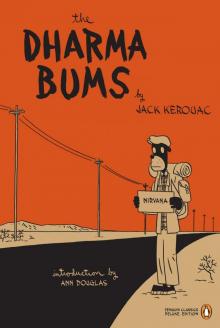 The Dharma Bums
The Dharma Bums Maggie Cassidy
Maggie Cassidy Big Sur
Big Sur Dr. Sax
Dr. Sax Vanity of Duluoz: An Adventurous Education, 1935-46
Vanity of Duluoz: An Adventurous Education, 1935-46 The Sea Is My Brother
The Sea Is My Brother The Town and the City: A Novel
The Town and the City: A Novel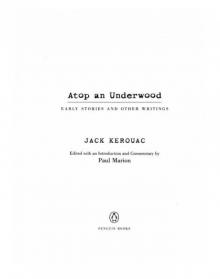 Atop an Underwood: Early Stories and Other Writings
Atop an Underwood: Early Stories and Other Writings Desolation Angels: A Novel
Desolation Angels: A Novel Book of Sketches
Book of Sketches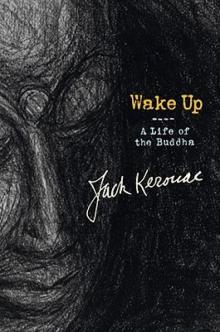 Wake Up: A Life of the Buddha
Wake Up: A Life of the Buddha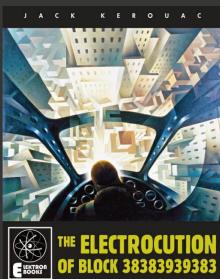 The Electrocution of Block 38383939383
The Electrocution of Block 38383939383 Haunted Life
Haunted Life Visions of Gerard
Visions of Gerard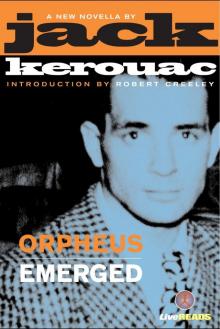 Orpheus Emerged
Orpheus Emerged Book of Blues
Book of Blues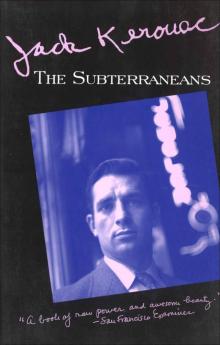 The Subterraneans
The Subterraneans The Haunted Life
The Haunted Life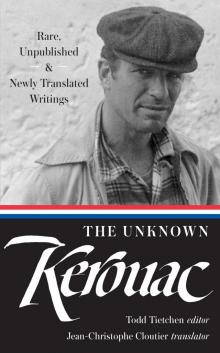 The Unknown Kerouac
The Unknown Kerouac The Town and the City
The Town and the City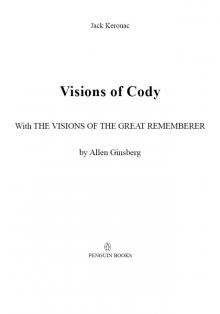 Visions of Cody
Visions of Cody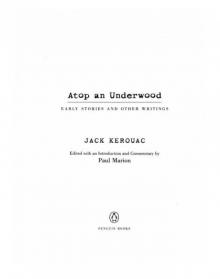 Atop an Underwood
Atop an Underwood Lonesome Traveler
Lonesome Traveler Jack Kerouac and Allen Ginsberg
Jack Kerouac and Allen Ginsberg Vanity of Duluoz
Vanity of Duluoz Desolation Angels
Desolation Angels On the Road: The Original Scroll: (Penguin Classics Deluxe Edition)
On the Road: The Original Scroll: (Penguin Classics Deluxe Edition) The Sea Is My Brother: The Lost Novel
The Sea Is My Brother: The Lost Novel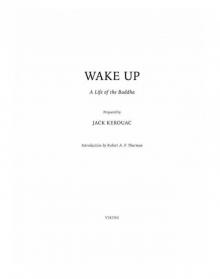 Wake Up
Wake Up The Poetry of Jack Kerouac
The Poetry of Jack Kerouac Doctor Sax
Doctor Sax